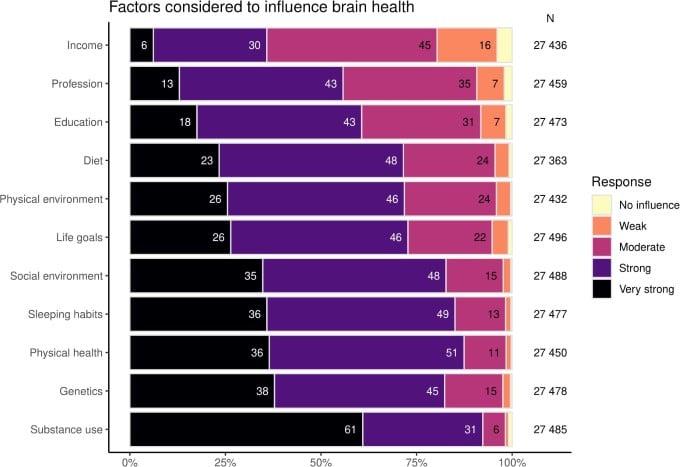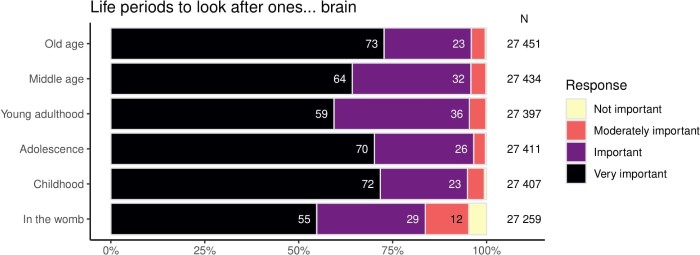Lifestyle and mental health linked to brain health
Research findings
|Published
Most people know that lifestyle and mental health can affect their brain health, although women and people with higher education are most aware. These are the findings of the largest global survey ever done to investigate public perceptions of brain health by researchers from the Lifebrain consortium
Over 27 500 people answered the Global Brain Health Survey, developed by researchers at the Norwegian Institute of Public Health and the University of Oslo, as part of the Lifebrain project.
The respondents answered questions about the factors they think influence brain health, during which life periods they consider it most important to look after their brain, and which diseases and disorders they associate with it.
Brain health is a relatively new concept encompassing mental and cognitive health. It includes mental well-being and the ability to remember, learn, plan and concentrate.
Lifestyle influences on brain health
The survey found that 9 out of 10 people know that substance use such as alcohol, smoking and drugs has a strong or very strong effect on brain health, and 8 out of 10 know that physical health, sleeping habits, social environment and genetics have a strong or very strong effect.

“It is very positive that people are aware that lifestyle factors can influence their brain health,” says Dr. Isabelle Budin-Ljøsne from the Norwegian Institute of Public Health, lead author of the survey.
This supports current scientific research, which finds certain lifestyle factors are associated with lower risk of developing brain disease, such as being physically active, eating healthily, getting enough sleep, reducing and/or limiting negative stress, and refraining from substance use such as alcohol, smoking or illicit drugs.
Although most respondents recognised the impact of lifestyle factors on brain health, women, and more highly educated respondents were more likely to rate lifestyle factors as important for brain health than men and participants with a shorter education.
Fewer respondents (below 60%) recognised the influence of socioeconomic factors on brain health.
“We still do not know much about how factors such as education and profession influence brain health, although poverty can increase the risk of mental health issues, and therefore also impact brain health,“ says Dr. Budin-Ljøsne.
All stages of life are important
Most respondents (over 95%) rated most life periods, from childhood to old age, as being important or very important for caring for the brain, although fewer (84%) ranked the prenatal period as important or very important. Again, women and higher educated respondents rated all life periods as more important than men.

“Taking care of the foetal brain during pregnancy is particularly important as the brain quickly develops during that period and needs to grow healthily,” says Budin-Ljøsne.
Mental health linked to brain health
99% of respondents associated Alzheimer’s Disease (AD) and dementia with the brain, and over 95% associated mental disorders such as schizophrenia and depression. Over 80% associated neurological disorders such as stroke and migraine with the brain. Again, women were more likely than men to associate these diseases with the brain, particularly for bipolar disorder, stroke and schizophrenia.
Budin-Ljøsne explains:
“It is very interesting that our respondents so clearly made the connection between brain health and mental health, which supports current scientific knowledge. This may indicate that more attention should be given by policymakers to address preventable mental health risk factors in populations.”
Fewer respondents (less than 30%) associated cancer, hypertension, diabetes and arthritis with the brain.
“Whilst these disorders are not defined as brain diseases, they still impact the brain, so it is important that public health actors educate the public about what brain health actually is. A simple message for connecting cardiovascular health with the brain is to explain that “what is good for the heart is good for the brain”.”
About the Global Brain Health Survey
These results were based on answers from 27,590 subjects from 81 countries (mostly in Europe) who responded to an online questionnaire in the Global Brain Health Survey. The majority of respondents were women and highly educated and were likely to be interested in brain health and were therefore not representative of the general population. We expect that other groups of people might not be so knowledgeable and might need targeted information about brain health.
The online survey was available in 14 languages, including French, Spanish, Dutch, Hungarian, German, Italian, and Scandinavian languages, between June 2019 - August 2020.
The Global Brain Health Survey is part of the Lifebrain project led by the University of Oslo, in collaboration with the Norwegian Institute of Public Health.
More results from the survey have been presented previously:
- Public report: How to promote citizens' brain health? (article on fhi.no)
- Public report: What motivates people to look after their brain health? (article on fhi.no)
Reference
Budin-Ljøsne I, Mowinckel AM, Friedman BB, et al. Public perceptions of brain health: an international, online cross-sectional survey. BMJ Open 2022;12:e057999. doi: 10.1136/bmjopen-2021-057999

